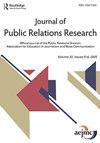Editor’s essay: a new chapter
IF 4.4
2区 文学
Q1 COMMUNICATION
引用次数: 0
Abstract
Change is the only constant, or so the Greek philosopher Heraclitus thought. In the public relations field, that certainly rings true. Social media and a decentralized internet brought with them the promise of a more engaged and informed publics, but the spread of dis/misinformation has become so rampant that news seeking on social media now negatively correlates with knowledge and engagement (Infield, 2020). Yet practitioners must divine ways to operate within this direct-to-public communication environment as traditional news media – and trust in them – simultaneously erode (UNESCO, 2022). Companies like Disney and Coca-Cola, which once prided themselves on avoiding sociopolitical controversy, now find themselves thrust into deepening culture wars (Barnes, 2022; Gelles, 2021). All the while, practitioners desperately search for ways to manage relationships and reputations amidst the fray. And as organizations amass power, wealth, and influence that rivals or surpasses that of nationstates, they now struggle to fulfill the increasing social responsibilities expected of them from both stakeholders and the public writ large (Scherer & Palazzo, 2011). These are just a few of the challenges facing our field, largely in corporate communication – to say nothing of nonprofit, governmental, and other sectors. How do we, as public relations scholars and professionals, meet this moment? As the incoming editorial team for the Journal of Public Relations Research, we’ve pondered this and many other questions in recent months. Volume 34 marks the beginning term of editor-in-chief Dr. Sung-Un Yang, associate editor Dr. Nicholas Browning, and senior editorial assistant Ejae Lee. We are humbled and grateful for this great opportunity to serve a vibrant community of public relations researchers, and we are committed to the continuance of JPRR’s prestigious status, editorial mission, and research impacts. Strangely, the concept of continuance just as much as change brings us back to that philosopher from antiquity:编者按:一个新的篇章
变化是唯一不变的,这是希腊哲学家赫拉克利特的观点。在公共关系领域,这当然是正确的。社交媒体和去中心化的互联网带来了更多参与和知情的公众的承诺,但谣言/错误信息的传播已经变得如此猖獗,以至于社交媒体上的新闻搜索现在与知识和参与呈负相关(Infield, 2020)。然而,随着传统新闻媒体和对它们的信任同时受到侵蚀,从业者必须找到在这种直接面向公众的传播环境中运作的方法(UNESCO, 2022)。像迪士尼和可口可乐这样曾经以避免社会政治争议而自豪的公司,现在发现自己被推入了不断加深的文化战争(巴恩斯,2022;gell, 2021)。一直以来,从业者都在拼命寻找在竞争中管理关系和声誉的方法。随着组织积累的权力、财富和影响力与民族国家相匹敌或超过,它们现在正努力履行利益相关者和公众对它们日益增加的社会责任(Scherer & Palazzo, 2011)。这些只是我们这个领域面临的一些挑战,主要是在企业沟通方面,更不用说非营利组织、政府和其他部门了。作为公共关系学者和专业人士,我们如何面对这一时刻?作为《公共关系研究杂志》(Journal of Public Relations Research)即将上任的编辑团队,我们在最近几个月里一直在思考这个问题和其他许多问题。第34卷是由总编杨成云博士、副总编尼古拉斯·勃朗宁博士、副总编李在杰担任的新一期。我们很谦卑,也很感激有这个机会为一个充满活力的公共关系研究人员社区服务,我们致力于继续保持JPRR的声望、编辑使命和研究影响。奇怪的是,延续和变化的概念将我们带回到古代的哲学家:
本文章由计算机程序翻译,如有差异,请以英文原文为准。
求助全文
约1分钟内获得全文
求助全文

 求助内容:
求助内容: 应助结果提醒方式:
应助结果提醒方式:


